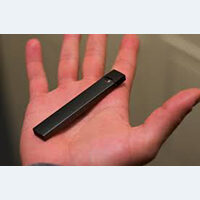
Health Advisory: New Vaping Device Especially Appealing to Youth
By Paige McGowan
Program Specialist, Tobacco, Vaping Device and Marijuana Prevention
Spokane Regional Health District

Considering the possible dangers associated with vaping device use by young people, Spokane Regional Health District (SRHD) alerts school personnel and the community about emerging vaping products and trends. A new device that could be particularly enticing to youth, called JUUL, is now on the market and there are several details to be aware of.
Adolescent years are times of important brain development. Brain development begins in-utero and continues to about age 25. Nicotine exposure during adolescence and young adulthood can cause addiction and harm the developing brain.
JUUL is designed to look like a USB flash drive, making it easy to conceal from unsuspecting teachers or families. Concerningly, the devices have an unusually high nicotine concentration—a single cartridge is equivalent to one full pack of cigarettes. Nicotine is a highly addictive substance and youth exposure increases the likelihood of lifelong addiction to nicotine and increased risk of youth transitioning to combustible cigarettes.1 JUUL also features nicotine cartridges available in many kid-friendly flavors.
Despite a Food and Drug Administration (FDA) ban on the sale of vaping products to people under age 18, youth are still accessing them. In Spokane County, 17 percent of 10th graders reported vaping within the past 30 days (Healthy Youth Survey, 2016).
And regardless of its relative newness, JUUL already has the highest market share in the industry, meaning it is currently the most popular vaping device. Similar products are cause for concern too. Pax brand’s Era2 vaping device is also designed with discretion in mind, making it easy to hide in a pocket or handbag at school or at home. Further troubling, these small vaping devices can be used to consume marijuana.
According to 2016 Healthy Youth Survey data, of those youth in Spokane County who reported using marijuana in the past 30 days (nearly 14 percent of all youth) only about one-third reported using marijuana alone; 60 percent reported using both marijuana and vaping devices. When youth use marijuana in vaping devices, it presents additional challenges to prevention efforts aimed at substance use and addiction. Marijuana is addicting and specific to youth it can have adverse effects upon the adolescent brain and is a risk for both cardio-respiratory disease and testicular cancer. It is also associated with psychiatric illness and negative social outcomes for youth.3
Even more alarming, of the youth who use marijuana, 22 percent reported using a combination of marijuana, vaping devices, and cigarettes. What does this mean for families and adults who work with youth? It means that tobacco, vaping, and marijuana use are all connected. It means school professionals need to be on the lookout for new products disguised as everyday items. It means that there has never been a better time to talk with youth about avoiding substance use. It also means when adults talk with youth about one substance (i.e., vaping), they should also talk about other substances, like tobacco and marijuana.
Many resources exist to help aid these talks and to help adults become more familiar with the ever-changing market for tobacco, vapor, and marijuana products. Here are some resources that can help:
- SRHD promotes the Escape the Vape campaign for youth to learn more about the chemicals found in vaping devices.
- SRHD has two campaigns to help educate adults on the laws pertaining to legal marijuana. More information can be found by visiting Weed to Know,* or Weed to Know Baby and You for more specific information for pregnant or breastfeeding women or parents with young children.
- Adults looking to learn more about talking to youth about substance use can visit starttalkingnow.org and review the site’s Parent Talk kit for tips.
- Those interested in receiving quarterly updates on tobacco, vaping device, or marijuana prevention can sign up to receive SRHD’s e-news called “Triangulum” by clicking here.
- Washington State has a Recovery Helpline (1-866-789-1511) available 24-hours a day. The hotline is a free, confidential resource for those struggling with issues related to mental health, substance abuse, and problem gambling. People can also call the helpline to talk about how to help someone they care about who may be struggling with substance use.
- Teen Link (1-866-TEENLINK) is a hotline just for teens. Teen Link is available every evening from 6:00pm-10:00pm (PST). Teens can call and get support from trained volunteers about a variety of issues.
- The Washington State Department of Health developed the Listen 2 Your Selfie - Youth Marijuana Prevention Campaign that educates youth about the risks associated with marijuana use, how marijuana use impacts health, and resources available.
- University of Washington’s Alcohol and Drug Abuse Institute has a website focused entirely on marijuana. The site includes fact sheets and resources for parents.
- The National Institute on Drug Abuse has a resource just for parents called “Marijuana: Facts Parents Need to Know”. Hardcopies of this resource are available at Spokane Regional Health District by emailing healthycommunities@srhd.org
- The Substance Abuse and Mental Health Services Administration has an app available to download that can help adults learn to have conversations with youth about alcohol and other drug use.
- In October 2015, SRHD issued news release announcing a Health Advisory specific to vaping devices and associated threat to the health of the region’s youth. The advisory’s companion was an in-depth description of vapor products and recommendations for school officials to help protect youth.
The health district encourages families to become familiar with any or all of these resources. School personnel can also review SRHD’s ‘Summary of the Public Health Risks to Youth and Recommendations for School Personnel' document. Again, this alert serves to educate schools, families, and people who work with youth to be on the watch for conspicuous vaping products that can cause harm to youth.

